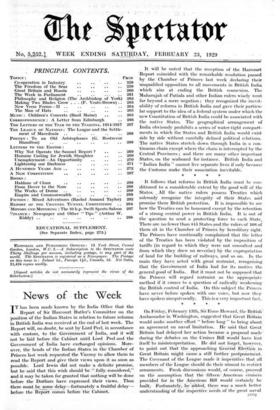It follows that reforms in British India must be Con-
ditioned to a .considerable extent by the good will of-the States. All the native rulers possess :Treaties which solemnly recognize the integrity of their Stites and promise them British protection. It is impossible-to see how the Treaties can be honoured except by the retention of a strong central power in British India. It is out of the question to send a protecting force to each State. There are no fewer than 445 States and the rulers of 108 of them sit in the Chamber of Princes :b-y hereditary right. The Princes have continually complained that the letter of the Treaties has been violated by the imposition of tariffs (in regard to which they were not consulted and from which they drew no revenue) by the expropriation of land for the building of railways, and so on. hi the main they have acted with great restraint, recognizing that the Government of India had for its motive the general good of India. But it must not be supposed that the Princes will regard restraint as the appropriate method if it comes to a question of radically 'weakening the British control of India. On this subject the Princes have never before spoken with one voice, but now they have spoken unequivoCally. This, is a very important fact.


















































